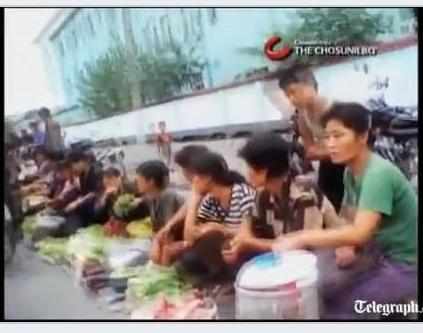North Korea is a “Tax-free country,” according to one of its many propaganda slogans, but this is contradicted by defector testimony, which suggests that residents carry a very heavy burden. According to defectors leaving the country after the North’s currency redenomination, North Korean people pay at least 20 to 30 percent of their monthly living expenses in the form of quasi-taxes to the state.
Since the redenomination, the minimum cost of living for a family of four has been in the vicinity of 50,000 to 60,000 won: around 35,000 for food and some 10,000 for other day-to-day necessities.
Next, North Korean residents pay at least 15,000 won for electricity and other utilities to the state.
Water and sewage and electricity cost, in total, around 1,000 won. Additionally, people have to give 30 percent of the earnings from their private fields every year. For a private field of around 40 pyeong (approximately 132m²), which is the general area for a single household, the farmer of the land has to pay around 3,000 won on average per month in usage fees, according to defectors.
In addition, if one adds other kinds of funding such as that for various kinds of local construction, military aid, fees for child education etc, the sum easily surpasses 10,000 won.
One defector, who arrived from Onsung in North Hamkyung Province in July of this year, said, “An elementary school in Onsung is instructing students to collect 10kg of apricot stones. If they cannot do that, the school forces them to give 5,000 won in cash. There are many cases of students who are unable to provide the apricot stones quitting school since they do not want to suffer under the burden.”
Another defector, who escaped from Hoiryeong in December last year, said, “Kim Ki Song First Middle School students had to pay 30,000 won every each three months for a school beautification project. However, many workers’ children were not able to tolerate that situation and quit.”
Another, who arrived in June from Hoiryeong, explained, “Even though the people were having to get food for themselves because of the absence of food distribution, the authorities took dogs, rabbits, leather or scrap from us all the time and, in addition, for the construction of a road, they pushed us to provide them with cement and bricks, so we had to offer all our income for several days.”
Besides all of this, the around 30 percent of people who do not have their own house have to pay at least 30,000 won in monthly rent.
Then, those who do businesses in the jangmadang have to pay between 300 and 2,000 won for each stall per day.
A defector, who did business in Chongjin until she defected in July last year, said, “The Provincial Committee of the Party took 300 won from each stall every day, and used 60,000 won of that for official expenses, gas for cars and entertainment for other cadres.”
Defectors say that the reason why the number of vagrants, so called kotjebi, has been increasing is also that they cannot afford to pay those fees.
Needless to say, while general people are weighed down by this heavy burden, high cadres in the Party, military or foreign currency earning bodies accumulate property through corruption, privilege, access to foreign currency earning businesses and the like, and enjoy their luxurious lives in high-class apartments in Pyongyang.
One defector who escaped from Pyongyang in February this year explained, “Since the currency redenomination, the preference for products rather than cash has been striking, so the price of apartments has risen a lot. In 2007, an apartment by the Daedong River was around $60,000, but now it is around $80,000 or $90,000.”
“While running errands, I visited one such apartment where high officials lived several times. It was amazing. They had foreign TVs, refrigerators and many other appliances. They used Korean or Japanese cosmetics and their shoes were all designer.”
A diplomat from the U.K. who visited Pyongyang in April, recently told the media that when he dropped by a fast food restaurant in Pyongyang most of the guests were students and some of them were wearing blue jeans and carrying cell phones.
The defector from Pyongyang criticized, “Newly built pizza or fast food restaurants in Pyongyang are like a playground for high officials’ children,” and concluded, “General local people are now struggling to feed this privileged class.”
The Daily NK conducted the interviews with defectors in this article with people who had just passed through the education course at Hanawon (the South Korean resettlement education center for North Korean defectors).

